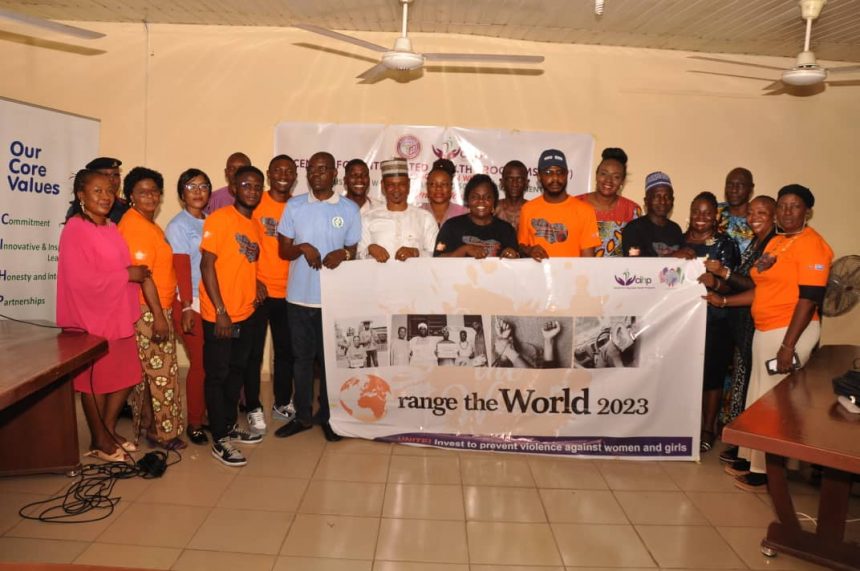16 days Activism:Activists harp on Multi-sectoral approach to end Gender Based Violence in Kogi
By Odimayo Olatunde Fredrick
Gender activists in Kogi State have called for a costed multi-sectorial action plan to put an end to Gender Based Violence, (GBV) in the Country.
The activists made the call on Thursday at a stakeholders engagement meeting to commemorate ORANGE the WORLD 16 days of activism against Gender Based Violence, (GBV) in Kogi State which was organized by Centre for Integrated Health Programs, (CIHP) in collaboration with the State Ministry of Women Affairs and Social Development.
Speaking at the occasion, the Executive Director, Challenged Parenthood Initiative, (CPI) Eunice Abimbola Agbogun noted that the costed multi-sectoral action plan is a multi-year road map designed to help the state to achieve its goal of eliminating violence against persons.
” It’s a critical tool in transforming the state’s broad goal of zero tolerance for violence against persons into concrete activities and policies. It determines the human, financial, material and technical resources needed for policy implementation. It’s design to justify resource mobilization and to leverage financial and technical resources from stakeholders.
“Executors of gender-based violence do not know the cost of activities, therefore costing of action plan provides guidance on implementation of the action plans.
Costed action plans provide guidance on which activities to give priority to, expand and support in a bid to put an end to all forms of Gender Based Violence in Kogi State and Nigeria in general” she stressed.
Also speaking, Kalu Samuel Uko, the Gender Mainstreaming Associate at CIHP said Gender Based Violence remains a societal nightmare that must be stopped, stressing that, all hands must be on deck to address this menace in the Country.
According to him, CIHP has continued to put in measures to ensure that States tap into their agenda to kick against all forms of Gender Based Violence across the Country.
Earlier in her remarks, the Kogi State Commissioner for Women Affairs and Social Development Hajia Fatima Kabir Buba admitted
Kogi state in recent past has witnessed a rise in cases of gender based violence though not fully reflected on the National Gender-Based Violence (GBV) data Dashboard which should serve as tools and for prevention and response to Gender Based Violence (GBV) in Nigaria.
Represented by the Ministry Permanent Secretary Stella Maris Andy, the Commissioner said “the Nigerian Demographic and Health Survey (NDHS) 2018 found that nine percent of women aged 15 to 49 had suffered sexual assault at least once in their lifetime and 31% had experienced physical violence.
“There are some of the gaps we are expecting this engagement to close. The Kogl State Government in the bid to mitigate the Increasing incidences of GBV in the State inaugurated a 23-member Technical Working Group to tackle Gender-based violence in the state with the cardinal objective of ensuring that gender equality is upheld in all spheres of human life.
“Tackling the challenge of absence of a harmonized platform for reporting, poor coordination of GBV case finding and reporting by increasing GBV case findings, providing access to clinical and non-clinical services to survivors of GBV will go a long way in ending gender-based violence in Kog state.
“Gender-based violence (GBV) is a phenomenon that transcends social, economic, and geographic borders and impacts girls, women, men, boys, and gender nonconforming individuals all over the world. GBV and harmful practices are rooted in power imbalances between the sexes and are fueled by multiple factors, including social and cultural norms, social acceptance of harmful practices, and insufficient legal protections. GBV and harmful practices disproportionately impact girls and women”.
Buba, however, admonished all stakeholders to focus on investments, financing, and implementation of different prevention strategies to prevent violence against women and girls.
In his remarks, the Chairperson, Kogi NGOS Network, Ambassador Idris Muraina admonished the present administration in Kogi State to include the Kogi State Multi-sectoral costed action plans in the 2024 budget for Kogi effective implementation of Violence Against Person Prohibition, (VAPP) law.
Muraina, who read a communique drafted at the end of the 16 days of activism against Gender Based Violence, (GBV) campaign held in Lokoja Kogi State said “Kogi State must adopt in totality the costed multi-sectoral action plan on GVB intervention. This summarily means that every ministry, department and agency in Kogi State will swing in issues of GBV in their annual budget and ensure it is captured.
“In that end, it will create what we call costed multi-sectoral action plan on GBV in Kogi State. It is expected for Civil Society Organizations to monitor and track costed multi-sectorial action plan on GBV to every NGO and ensure that they implement all what is contained in it.
“Other CSO’s who are engaging and updating on the areas of GBV should also work inline with the content of the multi-sectoral action plan that is already existing so that the State can have a harmonized intervention to stop Gender Based Violence in Kogi State.
“The coordinating mechanism which is the Ministry of Women Affairs and Social development coordinating through the technical working group should ensure that each member represented carry out their own activities diligently by ensuring that quarterly meeting are held to check the level of implementation of the costed multi-sectoral action plan on GBV by each of this Ministry, Department and Agencies.
“They should as well carry out advocacies to ensure releases of funds to each of the MDA’s
to carry out their activities and ensure that funds are disbursed to ensure the functionality of Sexual Assaults, and Referral Centres in Kogi State.
Our correspondent reports that in support of this civil society initiative, the United Nations Secretary-General launched in 2008 the campaign “UNITE by 2030 to End Violence against Women which runs parallel to the 16 Days of Activism.
It was further gathered that the campaign began at the inauguration of the Women’s Global Leadership institute in 1991 which is used as an organizing strategy by individuals and organizations around the world to call for the prevention and elimination of violence against women and girl.
End












